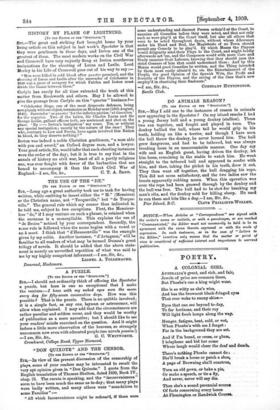HISTORY BY FLASH OF LIGHTNING. [To THE EDITOR OF TEE
" SPECTATOR."' SIR,—The great and striking fact brought home by your living article on this subject in last w eek's Spectator is that
they were gentlemen in those days, and Ireton one of the greatest of them. The most modern works on the Civil War and Cromwell have very unjustly flung at Ireton murderous insinuations for the shooting of Lucas and Leslie. Lord Morley in his Life of Cromwell goes out of his way to say :—
"Men were killed in cold blood after quarter promised, and the shooting of Lucas and Leslie after the surrender of Colchester in 1648 was a piece of savagery for which Fairfax and Ireton must divide the blame between them."
Carlyle has surely for all time extracted the truth of this matter from Rushworth and others. May I be allowed to give the passage from Carlyle on this " quarter " business P-
" Colchester Siege, one of the most desperate defences, being nowplainly without object, terminates on Monday next (28th August, 1648). Surrender' on quarter 'for the inferior parties,' at discretion' for the superior. Two of the latter, Sir Charles Lucas and Sir George Leslie, gallant officers both, are sentenced and shot on the place. 'By — Ireten's instigation' say some. Yes, or without any special instigation; merely by the nature of the case ! They who, contrary to Law and Treaty, have again involved this Nation in blood, do they deserve nothing ? "
Ireton was indeed a noble Christian gentleman, "a man able with pen and sword," an Oxford degree man, and a lawyer. Your good article, Sir, would infer that such shooting instances were the order of the day ; but it is true to say that in the annals of history no civil war, least of all a partly religious
one, was ever fought with fewer of the barbarities that are bound to accompany it than the Great Civil War of






































 Previous page
Previous page